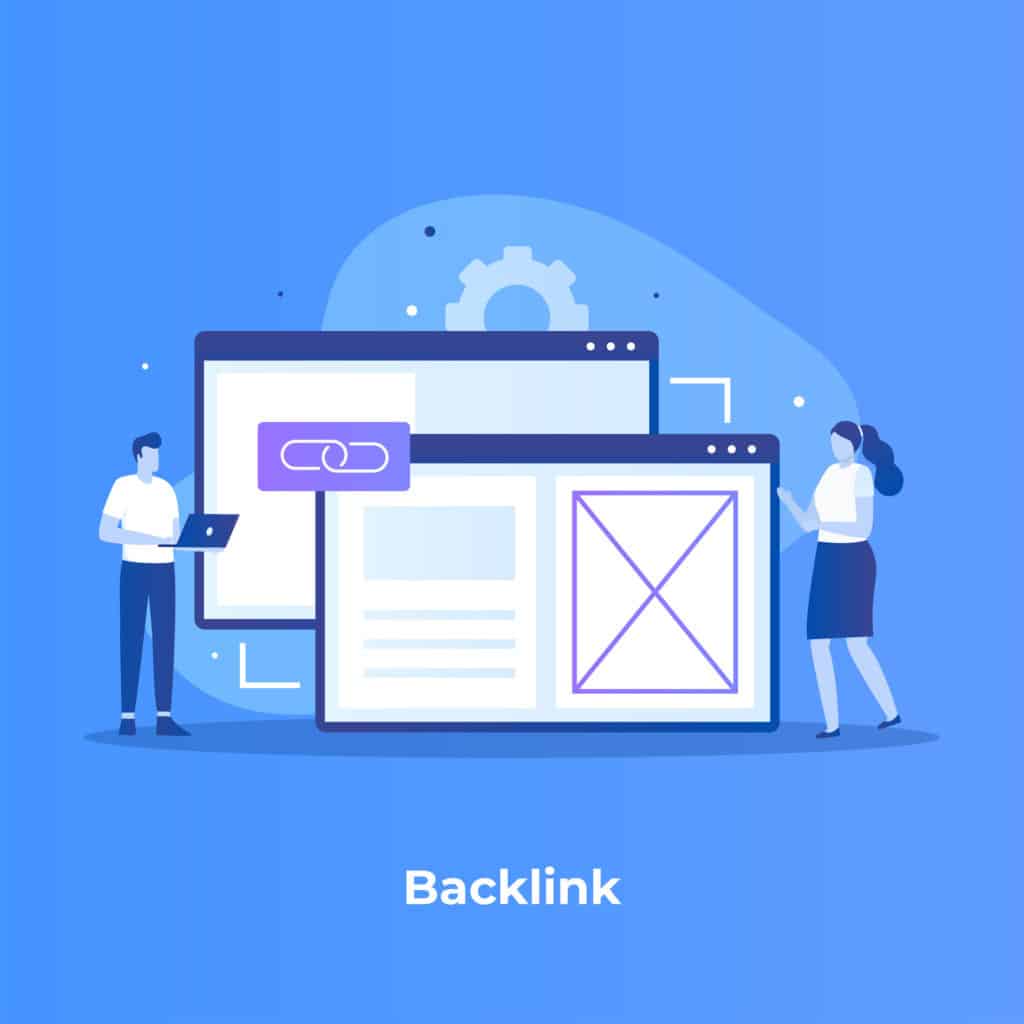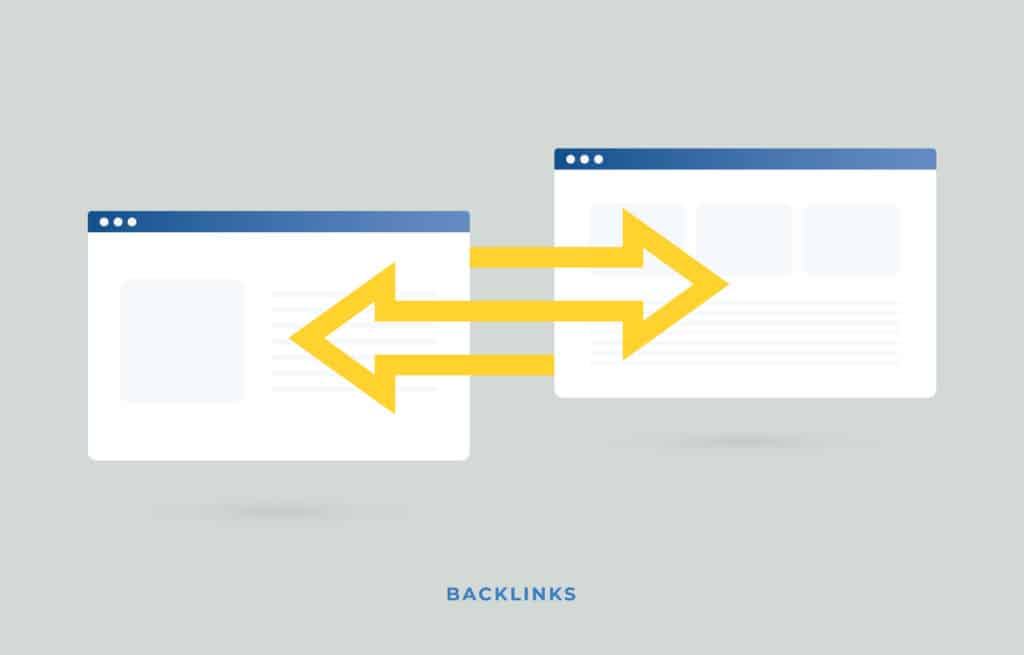Backlinks are essentially links from one website to another, they’re often found in blog posts, which often link material that connects in some shape or form to your own article.
Almost like referencing in your essay, backlinks are great to support what you are talking about through stats, other people’s opinions etc.
You can link to someone from your website and you would give them a backlink, then if they linked to you, you would have a backlink.
Here is a great example of a backlink, it fits within our theme for the blog as it tells us what are backlinks.
This link is great for this blog as it’s to the point, gives more information on backlinks and it is from a credible source within the industry.
However the most important feature with backlinks is that they will help you climb up the search engine results page.
Backlinks are a crucial feature of SEO, they are one of the most important components within the search engine algorithm to determine your positioning on the search engine results page.
Search engines love backlinks, they consider backlinks as votes or points. The more points you get the higher you will rank on the search engine.
Higher number of backlinks often mean higher amounts of organic traffic to your site through search engine results
Backlinks have been vital since time began (almost) as they were part of Google’s first original algorithm Pagerank. Since Pagerank there’s been thousands of changes to the algorithm but backlinks have stayed strong and are still a key ranking feature.
Google has confirmed that backlinks are still a key feature within SEO ranking, what Google says goes, make sure you have strong backlinks in your articles.
However it’s more important to focus on producing good quality content that people want to link to. If you’re producing good content in your field, backlinks will come.
Types Of Backlinks
Backlinks are one of the easier features to understand in the whole world of SEO.
Backlinks are a cornerstone for great SEO as they represent another website’s traffic coming to your website.
They essentially tell the search engine how credible and reliable your content is and is ranked accordingly to how many backlinks you have.
Before you go any further you need to understand the different types of backlinks.
Inbound Links
These are the backlinks that everyone wants. Inbound links are top tier backlinks as they are links from other people’s websites that come to your website.
Unfortunately since they require other people to link to your website and content they are often the hardest to secure.
Outbound Links
Outbound links are links from your website that link out to other websites. These are often used on blog posts to support your point of view by linking to relevant content.
Outbound links can also be used as a good bargaining tool to receive inbound links. The world of backlinks can be quite political and you can come to an agreement with another website to link to each other.
Internal Links
Similarly to outbound links, internal links are also fairly straightforward. Internal links are links between pages within your own website.
Internal links can be very useful as it keeps people on your website, this is good for business and SEO as your page will receive increased amounts of organic traffic.
Within these three links you then get what you call Nofollow and Dofollow links. These are slightly more complicated as they determine whether or not your link is ranked by a search engine.
Nofollow links
Nofollow links were created to stop people spamming websites, articles and comments sections with self promoting links. The Nofollow links tells search engines not to track the link, meaning it won’t affect your SEO score.
They don’t pass any value in terms of SEO but they are certainly not worthless.
Nofollow links can still be a great resource in getting traffic to your website, so shouldn’t be totally ignored.
Dofollow Links
Dofollow links are very similar to internal links, they are the prized possessions of backlinks within SEO. They get ranked by search engines so will help boost your SEO score.
However Dofollow links can both have a negative and positive impact on your SEO depending on the reliability and credibility of a link.
Anchor Text
Anchor text isn’t a type of backlink but it is the clickable words that form a backlink.
Anchor text and the placement of your backlink is crucial for the link to drive more traffic to your site. For instance you’re more likely to get more clicks the closer to the top of the page your link is.
This is just the nature of the online world, people have short attention spans whilst reading online. Most people don’t make it to the bottom of the article, you want the prime real estate at the top of an article.
Strong anchor text can be the difference between people clicking on your link to people scrolling past and ignoring it.
It’s not the most important thing regarding SEO but it needs to be thoughtfully constructed and relevant to the topic so that people will want to click on the link.
How Do Backlinks Work?
Having the various types of backlinks are all well and good, but like most things to do with SEO it is about the quality not quantity of your links.
The internal links are generally fine in this concept but you have to make sure that what you’re linking is relevant. There’s no point in just throwing random links in the hope it’ll be good for SEO.
Search engines need to see that what you are linking to is relevant, if it’s not you risk them lowering your rankings and even deindexing your content.
The same rules apply to outbound links in the sense of when you’re selecting them to link to your articles they need to be relevant to your topic.
It’s also worth noting that when you are putting in outbound links it is more favourable to link to more reputable sites.
However the rules get a little more complex when it comes to the inbound links Everybody wants them but they are hard to come by.
As mentioned, search engines prefer quality backlinks to hundreds of random links from websites that aren’t reputable or relevant.
This is called domain authority. It’s basically how reputable and credible the site is that is linking to your content. You want to link to a website that has as much domain authority as possible.
For example it’s better to have one link from Google themselves than hundreds of links from your next door neighbour. Unless of course they run a highly successful website in a similar field to yours.
Strong backlinks are the search engines’ nod of approval that your content is reliable and credible. They will like websites linking to you who have domain authority.
The search engine rewards you for the praise you get off a website who they already respect and hold in high regard. It’s like if you complete a task at work, it feels different if your boss says you did a good job once as opposed to your mum saying it every time you come home.
Search engines view backlinks in similar ways, your mum has to give you praise whereas it feels a lot more credible from someone who’s higher up than you.
When it comes to inbound links the number of sites linking to you is more important than the amount of backlinks you receive.
For instance it’s better to have 10 links from 10 different sites than 100 links from the same site.
This is because links from the same site actually diminish in value the more times they use your content.
How To Get More Backlinks
Now this is the big question that everyone wants to know. How do you get more backlinks?
Outbound and internal links are still necessary for your site but they are easy to put on your website. All you need to do is select relevant content to link to.
It’s always a good idea to have at least one internal link in each article, particularly the Contact Us page.
Inbound links however are the backlinks that everyone wants, they’re the real stars of the backlink world.
People will link to your content through one of two ways, you put your content to someone and they choose to link to you or someone finds your content and decides to link to it.
The simple answer on how to get inbound backlinks, like it is to everything regarding SEO is to create good quality content.
You need to create what is called linkable assets within your content, you need to have something on your website that is worth linking to.
Without having something that is worth linking to it is not worth thinking about backlinks, content is key that should always come first with your website.
That’s the easy answer out the way but how to source consistent strong backlinks can be a little harder.
That’s because as mentioned before you want your inbound links to come from people who show some sign of relevance to your field. Often this can mean your competition helping you or you beating them to new links.
It can be a very political field securing backlinks, it’s often a you scratch my back I’ll scratch yours, in the sense of if they give you a backlink you often have to give them one back.
One of the easiest ways to secure inbound links is to find websites that are linking to outdated websites or links that do not work anymore. Then email people who have linked to these sites to ask to see if they can link to yours.
A lot of securing inbound backlinks is toing and froing between emails and exchanges with other website owners to try and get them to link to you. This method can be useful but be aware that you may endure some radio silence.
Doing your research of what sort of content your competitors are putting out and who is linking to them can be key to help build links.
From there you can write better content than your competitors and email the sites which are linking to them and ask them to link to you.
This is a great way to get solid backlinks as you’ll be getting links because your content is good.
It really is worth just firing an email across to influencers and high profile companies within your field to ask if they will link to your content. Worst case scenario they say no and you move on with your day, best case they give you an amazing credible backlink.
Guest blogging is another easy way to get links to your own website. This way you essentially have free reign to link to your own content through another website.
It’s a guaranteed way to get you more backlinks which will in turn will hopefully boost you up the search engine results page.
Social media is also a very useful tool in securing more backlinks. Social media doesn’t directly affect SEO but what it does it allows you to project your content to a wider audience.
If you can get multiple people sharing your posts on social media the likelihood is that you may get one or two backlinks as a result of this.
Backlinks are all about word of mouth and people knowing and trusting you to produce good quality content that they can link to.
For a general rule of thumb, the easier it is to secure a backlink the less valuable it is for your site.
The key thing to remember like everything in SEO it’s about the quality of the link and your content not the quantity.













